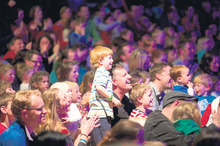The songs we sing
Derek Bigg considers how they affect us

‘Music is a gift of God... After theology I accord to music the highest place and greatest honour.’
So said Martin Luther, who composed chorales to be sung by all the people, not just the clergy as in the Roman Catholic Church of his day. It is largely to him that we owe today’s opportunities for congregational singing.
But do we make the best possible use of them? I will be asking some searching questions about the songs we sing. My prayer is that this will stimulate fruitful discussion and encourage a God-honouring approach to the musical side of church life.
My musical family
First, let me say a little about my background to show where I am coming from.
Music was always prominent in our family life. As a family we occasionally performed Leopold Mozart’s Toy Symphony. Two of my brothers followed musical careers, one of them becoming the youngest-ever Fellow of the Royal College of Organists at the age of 17. My father was an organist and choirmaster; and I myself have been a chorister. I have experienced a variety of musical traditions in both Anglican and nonconformist churches, including numerous evangelical churches in Spain. Four years’ training at the London Bible College, when Ernest Kevan was Principal, provided me with resources for bringing biblical teaching to bear on practical issues. Music is one such issue.
Just a matter of taste?
Is musical style merely a matter of personal taste? No. To some extent it mirrors the spirit of the age. As H.R. Rookmaaker said in Modern Art and the Death of a Culture, ‘there is nothing neutral’. Like other aspects of culture, music should be judged by the standards of God’s Word and by the effect it produces. Music can soothe a troubled spirit (1 Samuel 16.23), but it can also whip people into a frenzy.
Adolf Hitler would only listen to military bands and music composed by Richard Wagner. Wagner despised the music of his contemporary Felix Mendelssohn on account of its ‘Jewishness’ and advocated the elimination of all Jews from German society. Significantly, Hitler saw him as his sole predecessor. He attended several performances of Wagner’s opera Lohengrin. The explosive Prelude to Act 3 feels like a musical accompaniment to Hitler’s ranting speeches. For a complete contrast, take Elton John’s Candle in the Wind at Princess Diana’s funeral. It moved people to tears.
The renowned conductor Sir Thomas Beecham once said that, if he were a dictator, he would compel everyone between four and 80 to listen to 15 minutes of Mozart every day. In an educational research project some years ago, Mozart was played during school lessons. The result? Improved concentration, as the sheer beauty of Mozart’s melodies and harmonies evoked a tranquil, tension-free atmosphere.
What kind of atmosphere?
Since music invariably creates a certain atmosphere, we ought to ask what kind of atmosphere we generate through the music in our Sunday services and Christian conventions. John Bell of the Iona Community thinks we have swapped the model of the Victorian schoolroom for that of the theatre. Is this true? Has today’s pervasive pop culture influenced our music in any way? Does a Christian gathering in which music features strongly ever feel like a pop festival?
Like all God’s gifts, music can be used in a self-centred fashion or in a way that exalts God himself. Do our songs reflect the truth of God’s Word and promote godly living? If singing is to glorify God, we need to remove any obstacles that might hinder us. The questions below will draw attention to several possible hindrances.
Questions to face
To what extent are our minds engaged when we sing? Do we sing with both spirit and mind (1 Corinthians 14.15)? In his book And Now Let’s Move into a Time of Nonsense, Nick Page describes how the pop song has replaced the poem as the model for most Christian songwriters today. Poetry, he points out, stimulates serious reflection; but pop songs tend to provoke a purely emotional response, with the music taking precedence over frequently banal words.
Do some songs claim too much? If I sing ‘My love just keeps on growing’, am I displaying an indefensible self-confidence rather than a humble spirit?
How are tunes to be judged? Is it stating the obvious to say that they should be easy to follow? Sadly, there is an increasing number of tunes which are too complicated, making it difficult for the congregation to keep in step with the musicians and hampering concentration on the words. The main reason for this trend seems to be that most Christian songs today are written not for congregational singing but for performance before a listening audience. Is this a commendable development?
Words and music
All tunes should fit the mood of the words. Generally speaking, a major key and fast tempo suit a joyful theme, a minor key and slow tempo a sombre theme. But what if words and music clash? Does the triumphant ‘Hallelujah!’ in the hymn Man of Sorrows! feel strangely subdued when the new tune ‘Burney Lane’ takes it on a gentle downward cadence? Are the solemn words of the children’s song ‘We can’t be friends because of our sin’ neutralised by the jaunty music? Incongruously, the words ‘I’m sorry for the wrong I’ve done’ are set to lively, upbeat music.
Music affects us at a subliminal level more than we realise. If it conflicts with the message of the words, it may well become the dominating influence and win the battle between the two.
Childrens’ songs
We rejoice in the knowledge that Jesus is in the highest place, with a name that is above every name (Philippians 2.9). Do we revere this precious name and all that it represents when we sing nine times ‘How cool is that!’ in praise of Jesus’ miracles and deity? It may be groovy, but does it drag the Lord down to our level?
What kind of songs do we choose for our children to sing? Children learn through singing and need a balanced musical diet covering a variety of themes, including those we might be tempted to avoid, such as sin and judgment. Are we looking for songs that are faithful to Scripture, couched in simple, non-theological language? Do we check carefully not only the words themselves but also the style of writing? Children tend to take everything literally. What, then, will they make of Our God is a Great Big God ? The combination of ‘great’ and ‘big’ speaks of physical size! The song continues: ‘He’s higher than a skyscraper... deeper than a submarine’. Will this portrayal implant a distorted picture in children’s hearts and minds?
Spiritual blessing
Lots of questions! They raise issues we all ought to ponder; but let us also be grateful for all the songs that we can happily sing without any misgivings about their quality. Many of those produced in the last 20 or 30 years have been a source of great spiritual blessing.
One example must suffice. A heart-warming song by Stuart Townend and Mark Edwards directs our thoughts heavenwards as it focuses on life beyond the grave. Through helpful use of the first person singular I can make my own the words ‘There is a hope that burns within my heart’ (verse 1) and ‘lifts my weary head’ (verse 2). Firmly rooted in Scripture, the song strengthens our faith; and the fine poetry (eschewing language like ‘Cos the Lord don’t change at all’, found in another modern song) enables us at the same time to reflect on something ‘lovely’ and ‘praiseworthy’ (Philippians 4.8). More songs like this one, please!
Whatever our personal tastes may be, we must never forget that any sinful attitudes in the musical arena can easily undermine that unity which Paul urges us to maintain in Ephesians 4.3.
Our final question must therefore be: Are we applying this teaching of God’s Word and thereby exhibiting musical godliness?


